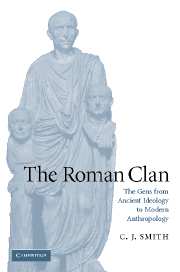Book contents
- Frontmatter
- Contents
- List of illustrations
- Preface
- List of abbreviations
- General introduction
- Part I THE EVIDENCE FOR THE GENS
- Part II TOWARDS AN INTERPRETATION OF THE GENS
- Chapter 5 The Roman community
- Chapter 6 The Roman curiae
- Chapter 7 The patricians and the land
- Chapter 8 The patriciate
- Chapter 9 Warfare in the regal and early Republican periods
- Chapter 10 Explaining the gens
- Chapter 11 Roman history and the modern world
- Appendix 1 Dionysius of Halicarnassus on the Roman curiae and religion
- Appendix 2 The missing curiae
- Select bibliography
- General index
- Index of ancient persons
- Index of passages discussed
Chapter 11 - Roman history and the modern world
Published online by Cambridge University Press: 22 September 2009
- Frontmatter
- Contents
- List of illustrations
- Preface
- List of abbreviations
- General introduction
- Part I THE EVIDENCE FOR THE GENS
- Part II TOWARDS AN INTERPRETATION OF THE GENS
- Chapter 5 The Roman community
- Chapter 6 The Roman curiae
- Chapter 7 The patricians and the land
- Chapter 8 The patriciate
- Chapter 9 Warfare in the regal and early Republican periods
- Chapter 10 Explaining the gens
- Chapter 11 Roman history and the modern world
- Appendix 1 Dionysius of Halicarnassus on the Roman curiae and religion
- Appendix 2 The missing curiae
- Select bibliography
- General index
- Index of ancient persons
- Index of passages discussed
Summary
In recent years, the relevance of Athenian democracy to modern political thought has become a popular topic of study. The 2,500th anniversary of Cleisthenes' reforms encouraged a number of important and influential accounts which have examined the nature of radical participatory democracy and its contemporary reflections. Modern accounts of political theory tend to begin with Thucydides, Plato and Aristotle. We are accustomed to hearing references to democracy in contrast to and comparison with ancient Greek exemplars, but the Roman model is far less commonly discussed. This is a modern phenomenon, and a tendency which has perhaps gone too far. In this last chapter, I wish to address an important critique of Roman politics, which goes some way to explaining why Rome is so often overlooked, and then I wish to make a claim for reinstating the study of Roman politics as a paradigm and model which merits our consideration as an important intellectual construct both in its own context, and for our own times.
It is inevitable that one should turn from the kinds of considerations raised here to the issue of the origins of the ancient city state. Before Bourriot and Roussel, our models were predicated on the evolution out of a tribal past with primitive kinship organisations. Models of state formation have generally worked with ideas of increased stratification, hierarchy, and settlement complexity. Nowadays, for the classical world, it is more clear that kinship is not a significant and necessary prelude to social complexity.
- Type
- Chapter
- Information
- The Roman ClanThe Gens from Ancient Ideology to Modern Anthropology, pp. 336 - 346Publisher: Cambridge University PressPrint publication year: 2006



